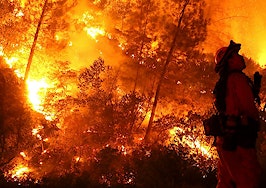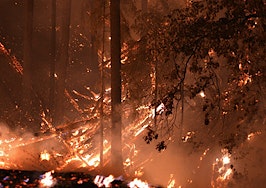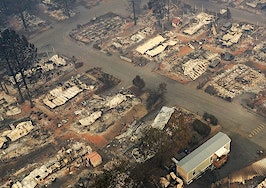As California struggles to cope with increasingly frequent and devastating wildfires, through the smoke one thing is clear: Real estate in the Golden State has been changed irrevocably. From the governor’s office down, demands for change are being voiced — and this will ultimately reshape the future of real estate across the state.
California’s wildfires are growing increasingly larger, appearing more frequently and wreaking record levels of destruction. While everyone has their own pet theories as to what is fueling the increase in fires, it is likely a combination of many things, including: climate change; improper forest management; tinder-like conditions after years of drought; beetle infestations killing countless trees; homes built in fire-prone locations and more.
Here are five keys ways the fires are changing the face of real estate in California:
1. Deepening the statewide housing crisis
California has been suffering, for the past number of years, through a state-wide housing shortage. The thousands of homes lost to fires the past two years alone has exacerbated the crisis.
With California losing a significant percentage of its housing stock, potential short-term effects include higher rental rates, increased housing prices and dramatic decreases in homeownership percentages for years to come. Santa Rosa, California is a model of this.
2. Diverting labor required to build new housing
Not only is California losing homes at horrific levels, the state lacks the amount of skilled labor required to rebuild in a timely fashion, especially in outlying regions.
In Paradise alone, officials state that the process of rebuilding lost homes can be expected to take at least a decade, to say nothing of any new development. California has long been struggling to maintain its skilled labor force, with many choosing to enter the more glamorous tech workforce instead of pursuing construction-related careers.
The economic crash beginning in 2007 also had an unfortunate effect on California’s labor pool: With no jobs and California’s high cost of living, skilled labor abandoned the state in record numbers and will not be coming back.
California’s new home builders have been scrambling for years to locate qualified construction workers, frequently importing work crews from out-of-state. The recent fires will divert labor from new home construction to recouping homes lost in the conflagrations, further deepening the shortage of new homes.
3. Increasing building costs
After the Wine County fires, the price-per-square-foot for construction/remodeling increased dramatically, including both labor and material costs. Additionally, previously updated building codes, design requirements and increasingly stringent energy efficiency standards (eg: Title 24) have been pushing prices upwards.
Even though county and city building departments have been working to streamline permit processes and approval times, the costs of obtaining building permits has soared.
Many Wine County victims were shocked to discover their insurance coverage did not include the higher costs of rebuilding. Coupled with ongoing trade issues with China and Canada, expect costs to continue climbing.
4. Challenging insurance companies
With nearly 12,000 homes lost in Paradise alone, insurance companies are in crisis mode, as stated by Mary Williams Walsh of The New York Times:
This has put pressure on property insurers, some of which have been declining to renew homeowners’ policies in fire-prone areas. When the houses that burned this year are rebuilt, their owners may find that no one is writing insurance there — at least not at affordable prices.
5. Changing future building codes
While many love living close to nature, it is coming with an increasingly high price tag. With a significant percentage of California’s homes built in the wildland-urban interface, the state is eyeing changes to its building codes to make homes more disaster proof.
Moving forward, counties with potentially fire-prone areas will have to grapple with two fundamental issues: First, local building departments need to decide whether or not they will allow any future building in hazardous zones. Second, if they do choose to issue building permits, expect significant changes in building codes both locally and on a statewide level to include fire-resistant materials, setbacks from vegetation, hazardous materials storage ordinances and more.
In an ironic twist, revised building codes will further increase the costs of building, further compounding an already expensive proposition and deepening the crisis.
While Californians love living in the Golden State with its moderate climate, access to vast forested areas, pristine national parks, abundant lakes and beautiful rural communities, living on the edge of civilization is coming with an ever-increasing price tag.
Governmental agencies ranging from local building departments to the State Insurance Commissioner are seeking solutions that will make living in the wildland-urban interface tenable in the future. This is not just a Californian issue: Natural disasters of all types are increasing in frequency across the nation, and as is often the case, how California responds usually sets the bar for the remainder of the country.
One thing is certain: recent fires across the state of California have ushered in a brand-new era with long-ranging implications that will permanently reshape the face of real estate – not only in California, but in other parts of the country as well.
Carl Medford is the CEO of The Medford Team.








